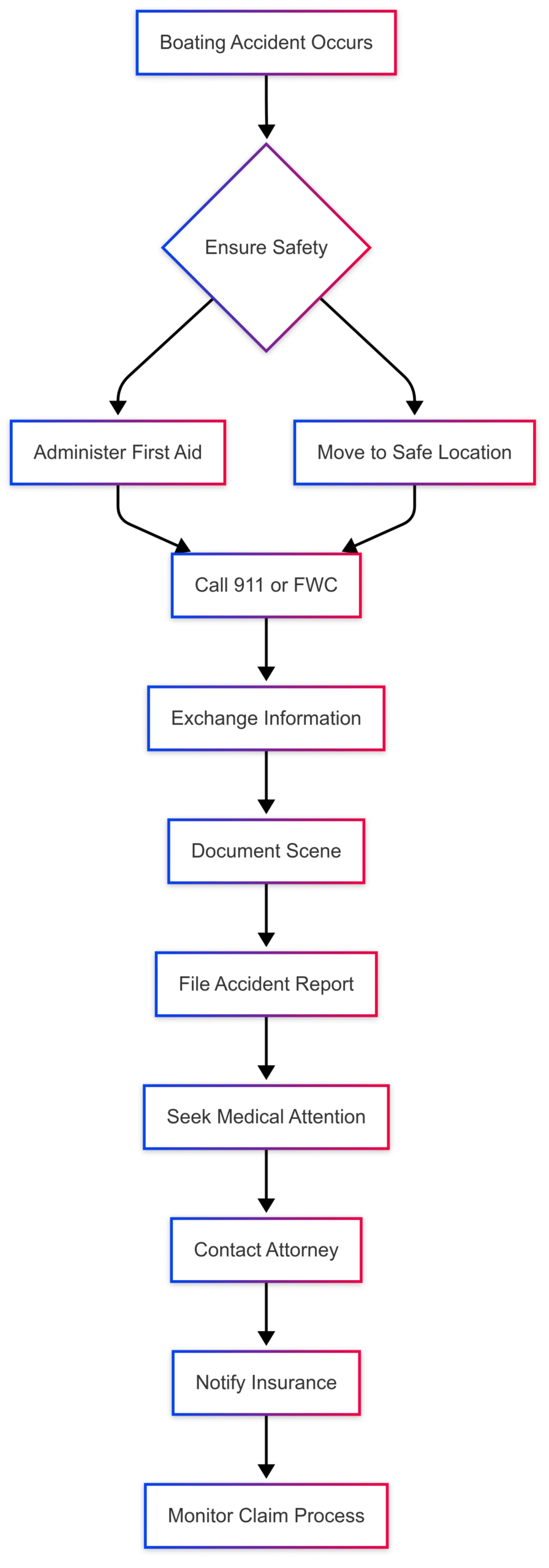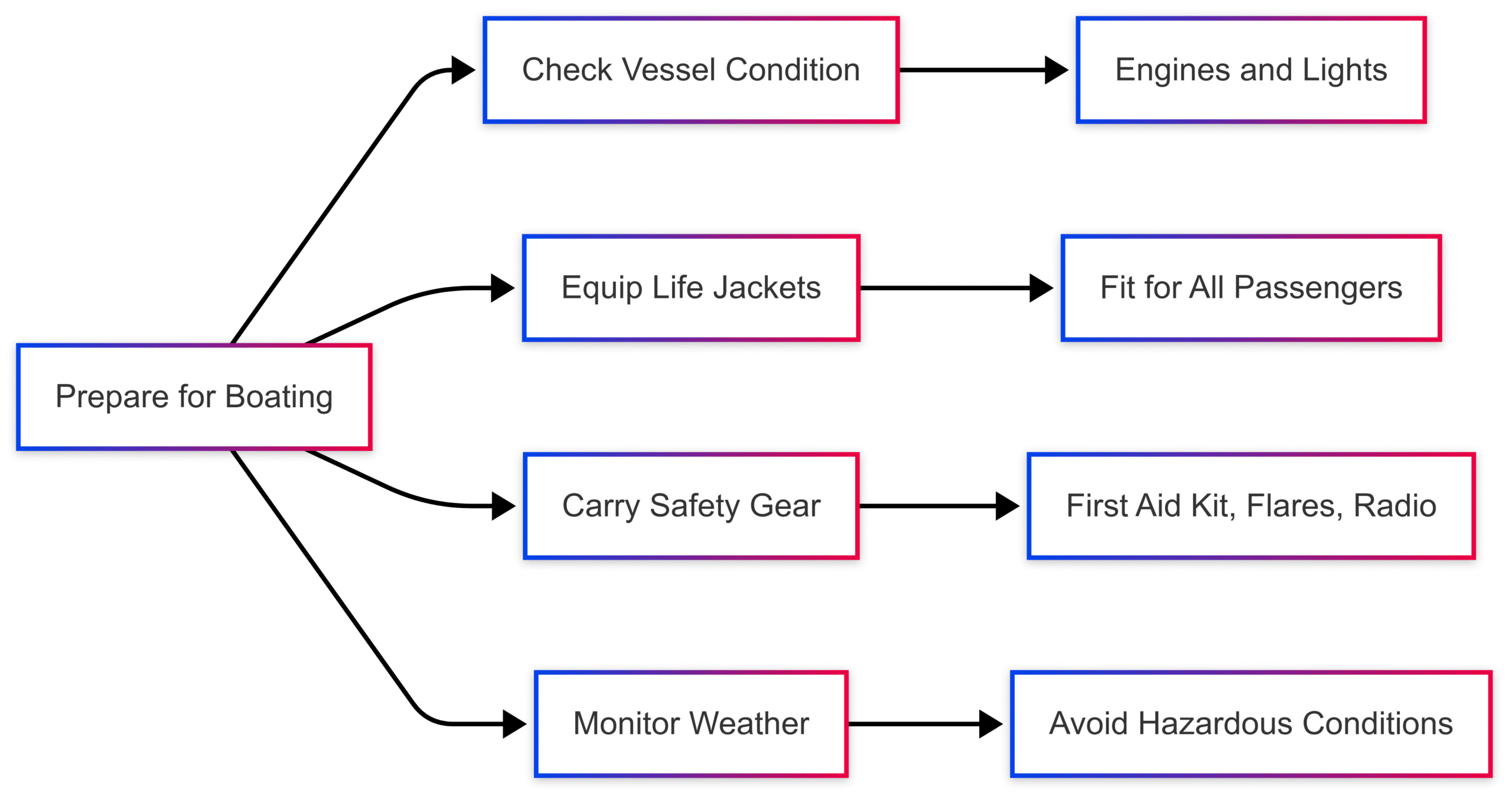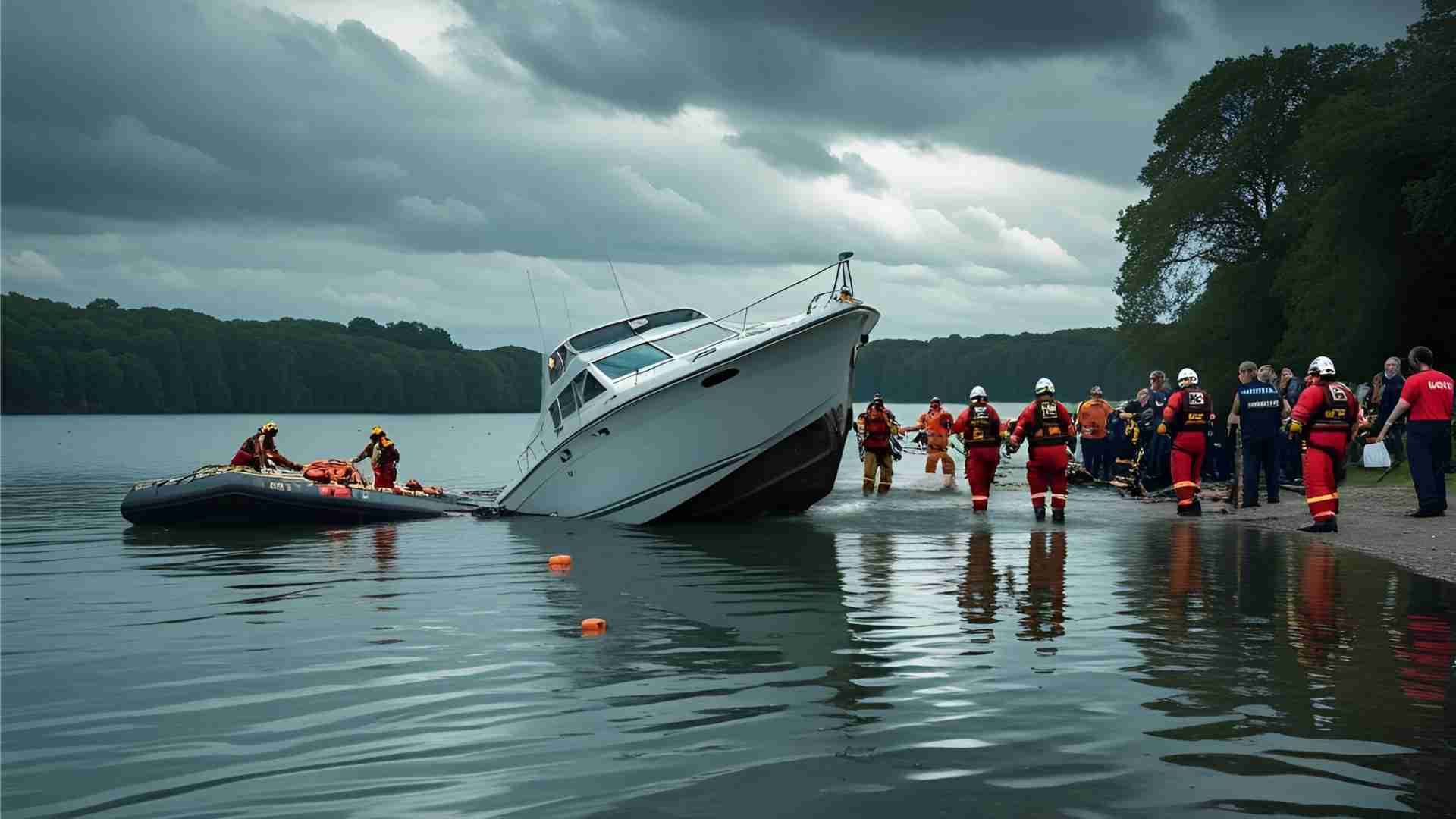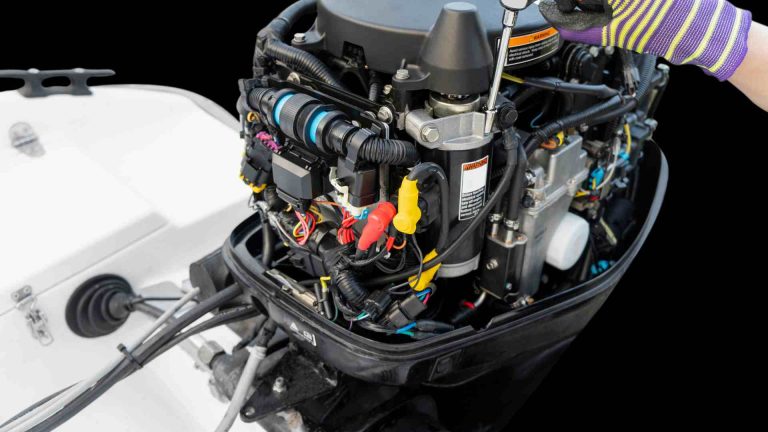Florida Boat Accident Reporting – how to file, requirements
Learn Florida boat accident reporting requirements, deadlines, and steps to file a report. Ensure compliance and protect your claim with our guide.
Florida’s extensive waterways, from the Intracoastal Waterway to the open Atlantic, make it a boater’s paradise. With nearly 1 million registered vessels, the state leads the nation in recreational boating. However, this popularity comes with risks—over 700 reportable boating accidents occur annually, according to the Florida Fish and Wildlife Conservation Commission (FWC). These incidents result in injuries, fatalities, and millions in property damage, particularly in counties like Miami-Dade, Monroe, and Broward. Understanding how to report a boating accident in Florida is critical for legal compliance, safety, and securing compensation for losses.
This guide provides a detailed overview of Florida’s boat accident reporting requirements, including when and how to file, key deadlines, and the role of a report in legal and insurance claims. We’ll also explore common causes of accidents, preventive measures, and how legal professionals can assist in navigating the aftermath.
Why Reporting a Boating Accident Matters
Filing a boating accident report in Florida is not just a legal obligation—it’s a critical step in ensuring safety, accountability, and fair compensation. A report creates an official record of the incident, which is essential for insurance claims, legal proceedings, and investigations into liability. Failure to report can lead to fines, legal penalties, or complications in personal injury or property damage claims.
Beyond legal requirements, reporting contributes to boating safety. The FWC uses accident data to identify trends, improve regulations, and develop safety campaigns. For example, the 2016 U.S. Coast Guard data reported 4,463 boating accidents nationwide, with Florida contributing significantly due to its high volume of registered vessels. By reporting incidents, boaters help authorities address risks and prevent future accidents.
Florida’s Boating Accident Reporting Requirements
Florida law, specifically Florida Statutes Section 327.301, mandates reporting for boating accidents under specific conditions. These requirements apply to vessel operators or, if the operator is incapacitated, the vessel owner. Below are the key triggers for filing a report:
When to File a Boating Accident Report
You must file a written boating accident report with the FWC’s Division of Law Enforcement or local authorities if the incident involves:
- Bodily Injury: Any injury requiring medical treatment beyond immediate first aid.
- Death: A fatality occurring within 24 hours of the accident.
- Disappearance: A person missing under circumstances indicating death or injury.
- Property Damage: Damage to the vessel or other property exceeding $2,000, or total loss of the vessel.
Even if the damage or injury seems minor, err on the side of caution. For example, a concussion may not show symptoms immediately, and internal vessel damage may not be visible right away. Reporting ensures compliance and protects your legal rights.
Deadlines for Reporting
The timing of your report depends on the nature of the accident:
| Incident Type | Reporting Deadline |
|---|---|
| Death within 24 hours | Within 48 hours |
| Injury requiring medical treatment | Within 48 hours |
| Disappearance of a person | Within 48 hours |
| Property damage over $2,000 or total loss | Within 10 days |
Immediate notification to law enforcement is required for incidents involving injury, death, or disappearance. For property damage-only accidents, you have up to 10 days to submit a written report.
Who to Contact
Reports must be filed with one of the following authorities, depending on the accident’s location:
- Florida Fish and Wildlife Conservation Commission (FWC): Division of Law Enforcement.
- Local Sheriff’s Office: In the county where the accident occurred.
- Municipal Police Department: If the accident occurred within a city’s jurisdiction.
- United States Coast Guard: For accidents in federal waters, such as those between states.
To contact the FWC, use the regional phone number listed on their official map. Prompt reporting ensures authorities can investigate while evidence is fresh.
Consequences of Not Reporting
Failing to file a required boating accident report can result in serious consequences:
- Legal Penalties: Noncompliance may lead to misdemeanor charges, fines, or imprisonment, depending on the severity of the incident.
- Claim Complications: Insurance companies rely on official reports to process claims. Without one, your claim may be delayed or denied.
- Liability Disputes: An incomplete or missing report can weaken your case, allowing the opposing party to challenge your account of the incident.
Prompt and accurate reporting establishes a clear record, reducing the risk of legal or financial setbacks.
Common Causes and Types of Boating Accidents in Florida
Florida’s waterways, while scenic, are prone to accidents due to high traffic, diverse vessels, and environmental factors. Understanding the causes and types of accidents can help boaters stay vigilant and comply with reporting requirements.
Common Causes
The FWC and U.S. Coast Guard identify several leading causes of boating accidents in Florida:
- Operator Inattention: Distraction or failure to monitor surroundings.
- Negligence or Inexperience: Ignoring navigational rules or operating a vessel without proper training.
- Intoxication: Operating a boat under the influence of alcohol or drugs.
- Equipment Failure: Mechanical issues, such as engine malfunctions or defective steering.
- Hazardous Conditions: Poor weather, rough waters, or low visibility.
- Reckless Behavior: Speeding or aggressive maneuvers, such as sharp turns.
- Overcrowding: Exceeding a vessel’s capacity, compromising stability.
Types of Accidents
Boating accidents in Florida vary in nature and severity, including:
- Collisions: Vessel-to-vessel or vessel-to-stationary object (e.g., piers, docks).
- Capsizing or Sinking: Often due to overloading, rough waters, or sudden maneuvers.
- Groundings: Running aground on shallow areas or reefs.
- Fires or Explosions: Caused by fuel leaks or electrical failures.
- Falls Overboard: Leading to drownings or disappearances.
These incidents can result in traumatic brain injuries, spinal cord damage, broken bones, lacerations, or drownings. Property damage may include visible hull damage, internal mechanical issues, or harm to nearby structures like docks.
Accident Statistics
The following table summarizes key data from the FWC’s 2022 boating accident report:
| Metric | Value |
|---|---|
| Reportable Accidents | Over 700 annually |
| Injuries | ~500–600 |
| Fatalities | ~60–70 |
| Property Damage (Nationwide) | ~$50 million (2016) |
Counties like Miami-Dade and Monroe consistently report the highest number of accidents, reflecting their heavy boating traffic.
Steps to Take After a Boating Accident
The moments following a boating accident are critical for safety, compliance, and building a strong claim. Follow these steps to protect yourself and others:
- Ensure Safety: Check for injuries and administer first aid if trained. Move the vessel to a safe location if possible to avoid further hazards.
- Contact Authorities: Call 911 for emergencies or the FWC for non-emergencies. Report incidents involving injury, death, or disappearance immediately.
- Exchange Information: Collect contact details, insurance information, and vessel registration numbers from other parties involved.
- Document the Scene: Take photos of damages, injuries, and environmental conditions (e.g., weather, water state). Note witness contact information.
- File a Report: Submit a written report to the appropriate authority within the required timeframe (48 hours for injuries/death, 10 days for property damage).
- Seek Medical Attention: Visit a doctor, even if injuries seem minor, to document potential issues like concussions.
- Contact an Attorney: Consult a boating accident lawyer to ensure compliance and protect your rights during insurance or legal proceedings.
Chart: Post-Accident Workflow
Below is a flowchart outlining the steps to take after a boating accident:

This workflow ensures you address immediate safety concerns, comply with legal requirements, and lay the groundwork for a claim.
How to File a Boating Accident Report
Filing a boating accident report in Florida is straightforward but requires attention to detail. The process involves gathering information, completing a form, and submitting it to the appropriate authority.
Information to Include
A comprehensive report should contain:
- Date, Time, and Location: Exact details of when and where the accident occurred, including waterway name and nearby landmarks.
- Vessel Information: Type, registration number, and identifying features of all vessels involved.
- Injuries and Damages: Descriptions of bodily injuries, medical treatment required, and property damage (e.g., hull, engine, or dock).
- Weather and Water Conditions: Visibility, wind speed, wave height, and other environmental factors.
- Witness Information: Names, contact details, and statements from any witnesses.
- Operator Details: Names, contact information, and license details of all operators involved.
Accuracy is critical—avoid speculation and stick to factual details. Incomplete or inaccurate reports can weaken your case.
Filing Process
- Obtain the Form: Download the FWC Boating Accident Report Form or request one from local authorities.
- Complete the Form: Fill out all sections thoroughly, ensuring clarity and accuracy.
- Submit the Report: Send the completed form to the FWC’s Division of Law Enforcement, local sheriff, or municipal police within the required timeframe.
- Keep Copies: Retain a copy of the report for your records and provide one to your insurance company or attorney.
If you’re unsure about any details, consult the FWC or a legal professional to avoid errors.
The Role of a Boating Accident Report in Claims
A boating accident report is a cornerstone of any insurance or legal claim. It serves as an official record that:
- Establishes Facts: Documents the incident’s circumstances, including time, location, and conditions.
- Determines Liability: Helps identify whether operator negligence, equipment failure, or external factors caused the accident.
- Supports Compensation: Provides evidence for medical expenses, lost wages, pain and suffering, or property damage.
For example, if a mechanical failure caused the accident, the report can highlight this, potentially implicating the manufacturer. If another operator was negligent (e.g., speeding or intoxicated), the report strengthens your case against them.
Impact on Insurance Claims
Insurance companies rely on the report to assess claims. A detailed report can expedite the process, while omissions or inaccuracies may lead to disputes. Prompt reporting also demonstrates good faith, reducing the risk of claim denial.
Impact on Legal Claims
In court, the report is a key piece of evidence. It can support personal injury or wrongful death claims by establishing the severity of injuries or damages. Courts may also use it to evaluate compliance with Florida law, which can affect the outcome of your case.
Seeking Compensation After a Boating Accident
If you’re injured or sustain property damage due to someone else’s negligence, you may be eligible for compensation. This can cover:
- Economic Damages: Medical bills, lost wages, and repair costs.
- Non-Economic Damages: Pain and suffering, emotional distress, and loss of quality of life.
- Wrongful Death Damages: Funeral expenses, loss of companionship, and financial support in fatal cases.
Filing an Insurance Claim
Notify your insurance provider promptly and provide a copy of the accident report, along with supporting evidence like medical records and photos. An attorney can help negotiate with insurers to ensure fair compensation.
Pursuing a Lawsuit
If the at-fault party’s insurer denies liability or the vessel is uninsured, you may need to file a lawsuit. Florida’s statute of limitations allows:
- Four Years for personal injury claims.
- Two Years for wrongful death claims.
- Three Years for accidents in federal waters under Admiralty law.
A boating accident lawyer can gather evidence, calculate damages, and represent you in court to maximize your recovery.
How a Boating Accident Lawyer Can Help
Navigating the aftermath of a boating accident can be overwhelming, especially with injuries, property damage, or legal complexities. An experienced attorney can:
- Ensure Compliance: Guide you through the reporting process to meet deadlines and requirements.
- Gather Evidence: Collect witness statements, medical records, and expert testimony to build a strong case.
- Negotiate with Insurers: Advocate for fair compensation, countering lowball offers or denials.
- Handle Legal Proceedings: Represent you in court if a lawsuit is necessary, navigating Florida or Admiralty law.
Firms like McPherson & Thomas, P.A., or Jurewitz Law Group specialize in Florida boating accidents, offering expertise in both state and federal regulations. They can also assess whether third parties, such as manufacturers, share liability for defects.
Boating Accident Prevention Tips
Preventing accidents is the best way to avoid the need for reporting. Follow these safety practices:
- Avoid Alcohol: Operating a boat under the influence is illegal and dangerous. Even passengers should drink responsibly to maintain awareness.
- Follow Speed Limits: Adhere to waterway speed restrictions to prevent collisions or capsizing.
- Check Equipment: Ensure your vessel is in good condition, with working navigation lights and engines.
- Wear Life Jackets: Equip all passengers with properly fitted life vests. They can be lifesavers in capsizing incidents.
- Avoid Overcrowding: Respect your vessel’s capacity to maintain stability.
- Prepare for Emergencies: Carry a first aid kit, flares, and a VHF radio for communication.
- Monitor Weather: Check forecasts and avoid boating in hazardous conditions.
Chart: Boating Safety Checklist
Below is a checklist for safe boating practices:

Implementing these measures reduces the risk of accidents and ensures compliance with safety regulations.
FAQs About Florida Boating Accident Reporting
What should I include in a boating accident report?
Who do I report the accident to?
What happens if the other operator flees the scene?
How does a report affect my claim?
What are the penalties for not reporting?
Conclusion
Boating accidents in Florida, while often preventable, are a reality of the state’s vibrant waterways. Filing a timely and accurate boating accident report is essential for legal compliance, safety, and securing compensation. By understanding the requirements—when to file, who to contact, and what to include—you can protect your rights and contribute to safer boating practices. If you’re involved in an accident, consult a qualified boating accident lawyer to navigate the complexities of reporting, insurance claims, and potential lawsuits. With the right steps, you can recover from the incident and hold negligent parties accountable.
For legal assistance, contact firms like McPherson & Thomas, P.A., or Jurewitz Law Group for a free case review. Stay safe on the water, and always prioritize preparation and compliance.
Happy Boating!
Share Florida Boat Accident Reporting – how to file, requirements with your friends and leave a comment below with your thoughts.
Read Faria Gauges vs. VDO Gauges: Which is Better? until we meet in the next article.






